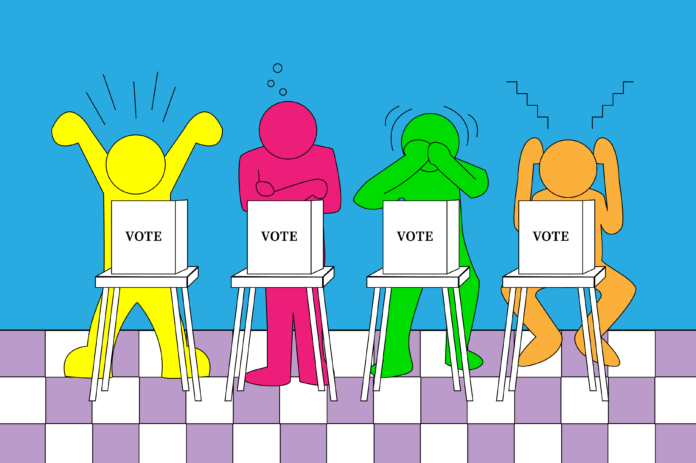Following the failure of the TGIF ballot measure despite popularity, ASUCD senators reflect on what can be done to increase turnout in the future
By LILY FREEMAN — campus@theaggie.org
The fall 2022 ASUCD elections had a historically low voter turnout of 5.58%, according to the ASUCD elections website, with less than 2,000 undergraduate students participating in the election. The site also outlines that voter turnout has been consistently below 20% since the spring 2016 election, with the exception of the winter 2019 election.
The ASUCD elections have a significant impact on students whether they vote or not, according to Senate President Pro Tempore Gaius Ilupeju, who encouraged students to vote in future elections.
“The senate candidates […] approve an $18 million budget that is assembled through student fees and allows for the continuation of services like Unitrans, which is utilized not just by undergraduates but the entire city of Davis and other vital services like the CoHo and the Pantry,” Ilupeju said.
ASUCD Senator Stephen Fujimoto, who was elected to his current position in the fall 2022 election, shared his thoughts about the persistent issue.
“[It’s] concerning,” Fujimoto said. “Our work is going to affect pretty much every UC Davis undergraduate here on campus, [but] only 5.58% had a say in who their elected leaders are.”
Ilupeju expressed similar concerns.
“What we are witnessing right now with election turnout is not new,” Ilupeju said. “It has been a problem for years, but COVID-19 exacerbated that issue. I think I speak on behalf of all of the ASUCD Senate members [when I say] that we are not pleased with the election turnout. We have been having conversations about how to move forward and what we can do in upcoming quarters.”
Without a voter turnout above 20%, any initiative that involves student fees automatically fails, according to the ASUCD Constitution, regardless of the majority vote. As a result, several initiatives on the ballot over the past few years have failed despite popularity. This includes one that sought to eliminate portions of athletic fees and most recently, a measure that would provide continued funding to The Green Initiative Fund (TGIF), which is a group on campus that provides financial resources to sustainable organizations and projects run by UC Davis undergraduate students.
This is the second time that the TGIF fee referendum has failed due to insufficient voter turnout, which originally appeared on the ballot in the spring of 2021. Madison Suoja, the program manager for TGIF, spoke about the next step they’re planning to take in order to secure funding for the program and what will happen if the measure fails again.
“[The spring 2023 election] will almost definitely determine the fate of TGIF,” Suoja said. “If we do not pass, TGIF is likely going to end at the end of this year.”
Ilupeju outlined various strategies that he said ASUCD is hoping to implement for upcoming elections in order to address the voter participation issue.
“One of the bills you will be seeing at the first ASUCD Senate meeting of winter quarter will be to create an internal committee that looks at issues pertaining to engagement and outreach,” Ilupeju said. “This committee will look into holding events during elections that make them more pronounced in the campus environment. [We want] to have a physical presence, where we can engage with people and interact with them to express more ideas and provide information about the elections.”
Ilupeju said that ASUCD also plans to raise election awareness through marketing on Unitrans buses, displaying election information on the television screens in the CoHo and collaborating with Student Housing and Dining Services to publicize election information.
Fujimoto said that he believes another approach to increasing voter turnout is to make the elections more competitive.
“The head of ASUCD, our main student representative to the chancellor and the Academic Senate, the External Affairs Vice President, the Transfer Student Representative and the International Student Representative were all uncontested [during the fall 2022 elections],” Fujimoto said. “I find that deeply problematic. If races were more competitive, candidates [would be] more likely to encourage students to vote, and there would likely be a wider electorate.”
Fujimoto went on to raise another idea, which is not a current plan in motion but is one that he has affirmed his support for. According to Fujimoto, UC Santa Barbara has a 20% voter turnout requirement for all student government elections to be considered valid — and Fujimoto said that he believes a similar widening of the turnout requirement would increase the effort that candidates put into advertising the election.
“We have a turnout requirement for initiatives involving student fees,” Fujimoto said. “Maybe we explore something like a turnout requirement for all races. If it meant that to get a position, we needed a [specified] voter turnout, I am sure that candidates would be very eager to raise awareness. I am definitely curious to see if that would be something that students want their elected leaders to pass.”
Fujimoto concluded by emphasizing why he believes it is important for students to take the time to vote in ASUCD elections.
“We make decisions that affect you,” Fujimoto said. “Whether you vote for us or not, we are the final say for how an $18 million budget is allocated and spent, which includes fees collected from students. We are also trying to represent and speak on behalf of you, so if the voter turnout is low and we are not in line with what the student body wants and what they think is right, that is going to be an issue.”
Written by: Lily Freeman — campus@theaggie.org




